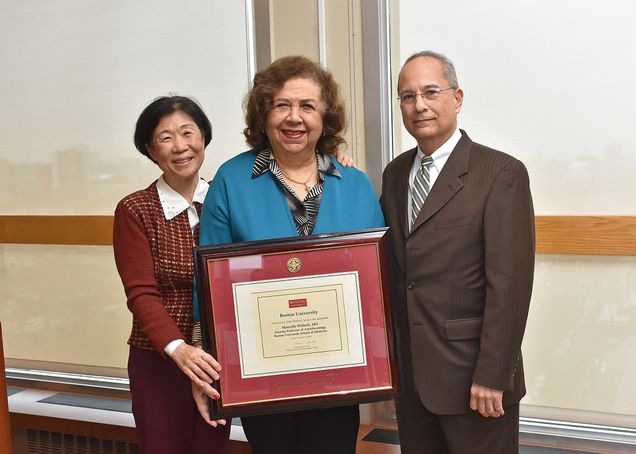Marcelle Willock Appointed Professor Emerita

Marcelle Willock, MD, former Professor and Chair of the Department of Anesthesiology, has been appointed Professor Emerita and is the first African-American woman to achieve this status at Boston University School of Medicine.
Serving as department chair from 1982-98, Dr. Willock was among the first women of color to lead an academic and clinical department in the United States.
Emeritus is a status of honor and esteem intended to recognize professors for lifetime contributions to a university, to their field or to both upon their retirement.
It was Leah Lowenstein, MD, a former Professor and Associate Dean at the School, who encouraged Dr. Willock to apply for the position. Dr. Lowenstein later joined Jefferson Medical School (now the Sidney Kimmel Medical College) in Philadelphia, becoming the first female Dean of a co-ed medical school in the United States.
At this year’s annual MLK Celebration, Dr. Willock’s appointment as Professor Emerita was recognized by Rafael Ortega, MD, Associate Dean of Diversity & Inclusion. After accepting her certificate, she highlighted how Dr. Lowenstein’s encouragement impacted her own journey. “I want the students and junior faculty to realize the tradition, the legacy, what you can accomplish and to never forget your roots and those who helped you.”
Dr. Willock is an active member of the American Society of Anesthesiologists and one of the leaders of the Wood Library-Museum of Anesthesiology in Schaumburg, Ill., where she is featured in The John W. Pender Collection of the Living History of Anesthesiology, an honor bestowed to selected anesthesiologists for their outstanding contributions to the specialty.
While serving in the former Boston University Medical Center Hospital and Boston City Hospital (now Boston Medical Center), Dr. Willock had a number of noteworthy accomplishments, including accrediting the BUSM residency program and modernizing the administration of anesthetics from a professional and technological standpoint. She was responsible for standardizing guidelines related to patient safety and for the introduction of pulse oximetry, capnography and transesophageal echocardiography, among other innovations, into operating rooms. In the early 1980s, there still were dentists providing anesthesia care at Boston City Hospital. One of her most remarkable actions was to end this practice and to assure that only qualified physician anesthesiologists could provide anesthesia care following the care team model promulgated by the American Society of Anesthesiologists.
She served on innumerable committees on the Medical Campus, was president of the Massachusetts Society of Anesthesiologists, president of the Society of Academic Chairs, and held a variety of leadership positions within the American Society of Anesthesiologists. She continues to serve as president of the Louis and Martha Deveaux Foundation, a charitable organization in the Republic of Panama.
Dr. Willock also has been a consultant for the Federal Bureau of Investigation (FBI), a member of the Board of Directors for the Boston Police Athletic league, worked in the Office of the Chief Medical Examiner in New York City and served as a trustee for the College of New Rochelle. After leaving BUSM, Dr. Willock became the first female Dean of Charles Drew University College of Medicine and Science in Los Angeles, where she retired in 2005. An advocate for civil rights and diversity, she has collaborated with many programs addressing health care disparities and the fair treatment of minorities.
“How fitting it is to be recognized at Martin Luther King’s event,” said Dr. Willock, after receiving her certificate from Dr. Ortega and Hee-Young Park, PhD, Associate Dean for Faculty Affairs and Chair of Medical Sciences & Education at BUSM.
“You are living history,” said Dr. Ortega. “As Professor Emerita, Dr. Willock enriches our roster of faculty who have made great contributions to our School of Medicine. This appointment sends a strong message that we value her contributions and that we recognize her as a role model for our students, residents and faculty alike.”